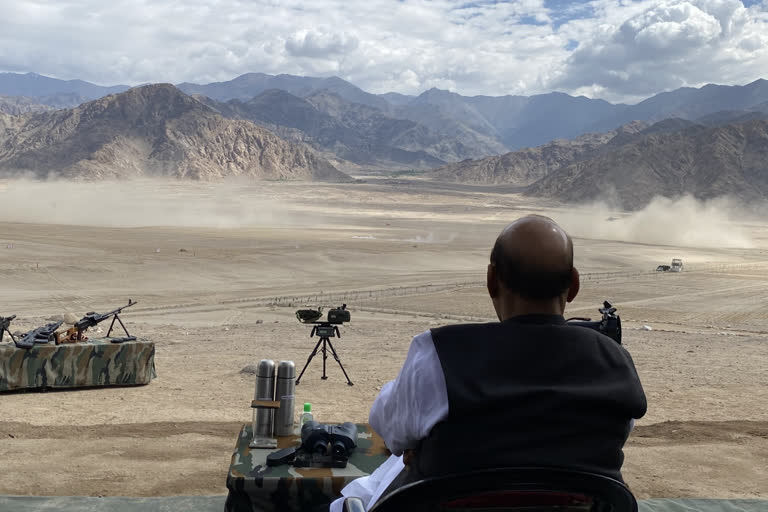Hyderabad:Evoking a keen sense of patriotism and bringing back poignant memories of the 1960s, Rajnath Singh, the defence minister of India, in a thinly seated arrangement at the Indian parliament where a monsoon session is going on, briefed the nation about the status of Indian troops at the LAC against the Chinese PLA.
Whether dry barren mountains of Ladakh grow a blade of grass or not but it still holds value for India’s territorial integrity is what the Defense Minister of India tried to emphasize on in his patriotic emotional speech on the second day of the Monsoon session.
Unlike Jawaharlal Nehru’s statement which he made in the Parliament in 1961 that “not a single blade of grass grows in Ladakh’s contention belt, Rajnath Singh was all praise for troops who, he said, ‘are leaving no scope for any compromise on even an inch of India’s territory.’
Read: India is committed to peacefully resolve border stand-off with China: Rajnath
One of Nehru's Congress colleagues, Mahavir Tyagi had made a sarcastic remark for his comment: “Nothing grows here … should it be given away to somebody else?” That statement had badly dented Nehru’s political image.
On the contrary Prime Minister, Narendra Modi’s Ladakh visit was being lauded and Singh made a mention in his speech that morale of India troops is high after the PM’s visit to the region. Detailing about the military preparedness at the LAC, Singh said, "India is aptly prepared for the long haul".
Troops have been facilitated to combat harsh weather which is the biggest enemy at the high altitude area of Ladakh where the temperature goes to minus 40.
Singh’s every word was meticulously measured. China’s claim over 90,000sq kilometres of Indian territory in Arunachal Pradesh and Pakistan’s handing over of 5,180 sq kilometres of Indian land in Ladakh to China was a reference to subtly ask China to admit and respect the status quo of the LAC and India’s perception over it, which China seems to be in disagreement.
'Indian forces are determined to protect security, sovereignty of country'
There is a huge build-up on both sides at the LAC, particularly after Chinese troops resorted to violence in Galvan valley and attacked India’s normal routine patrol, on 15th June, in which 20 Indian troopers lost their lives. Though both the sides had agreed on 6th June to avoid any confrontation, as a result of any activity, which will change the status quo of the LAC. Rajnath delivered another candid message to China during his Lok Sabha statement today that any attempt, be it diplomatic or military, to change the status quo of LAC unilateral will be thwarted tooth and nail.
On the contrary, India’s military preparedness before 1962 wasn’t bad either. India, in fact, was strategically at the advantageous positions at many points like Thang la post which overlooks some villages of Tibet, Khenzemane, Dhola post and other areas near Mac Mohan line. The Nehru government had filled all the major gaps between the patrolling posts from 1959 until the war broke out. Enough preparedness was made but the political and diplomatic posturing was not as apt as it is now. The statements made inside the parliament or outside of it were amateurish. The political posturing was loose. There was a huge communication gap between various troops manning the borders.
Troops like the Assam Rifles which would man the eastern border had no communication with the army as Assam Rifles would report to the civilian government which had no idea of border protocol. The international posturing over the border dispute in the '60s was inadequate and inappropriate. China being the aggressor made the world feel as if it was a victim whereas it is completely exposed this time. The international reach is much better now as compared to the then Nehru government.
In fact, the formation of Special Frontier Force, now the elite force of India trained to combat covert operations in high altitude regions, was Nehru’s brainchild after Tibetans migrated to India during the uprising in 1959. But disclosure of SFF by the present government after one of its members died in Ladakh earlier this month was a big blow to China. Nehru’s contribution to nation-building cannot be ignored but public posturing in the context of LAC is what politicians shall know the best.
Also Read: Congress slams Centre over India-China border tension
